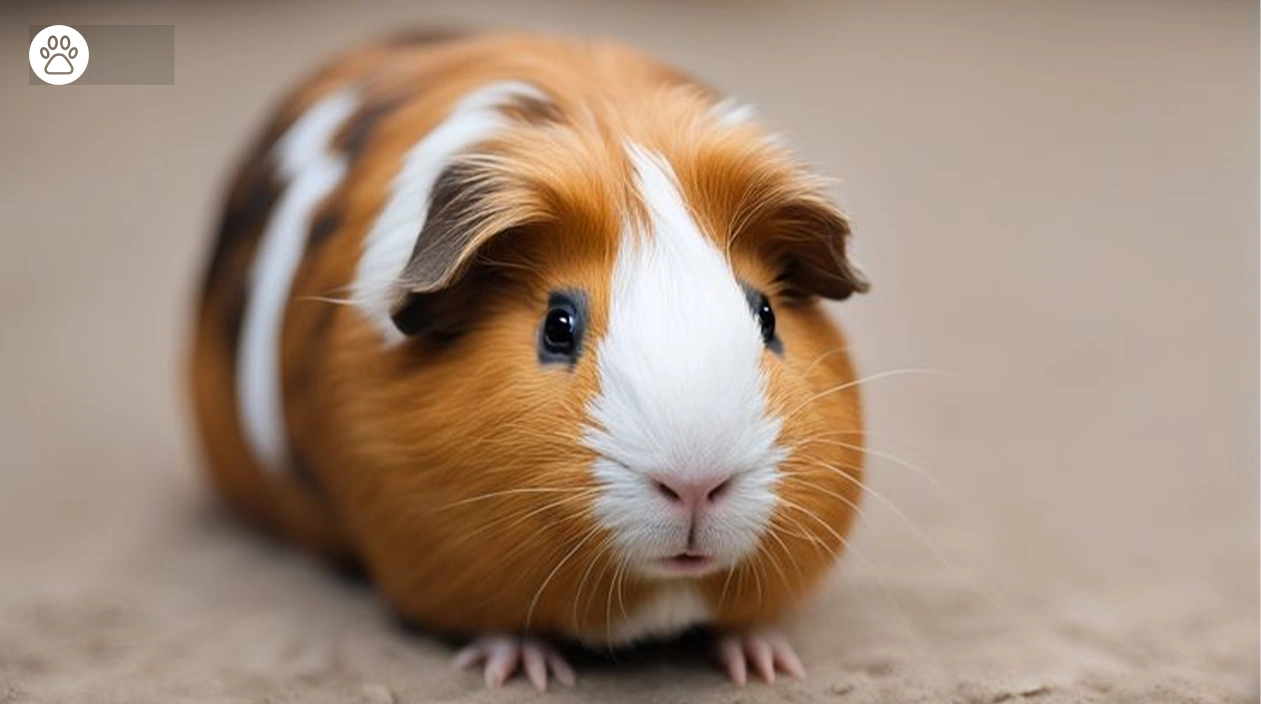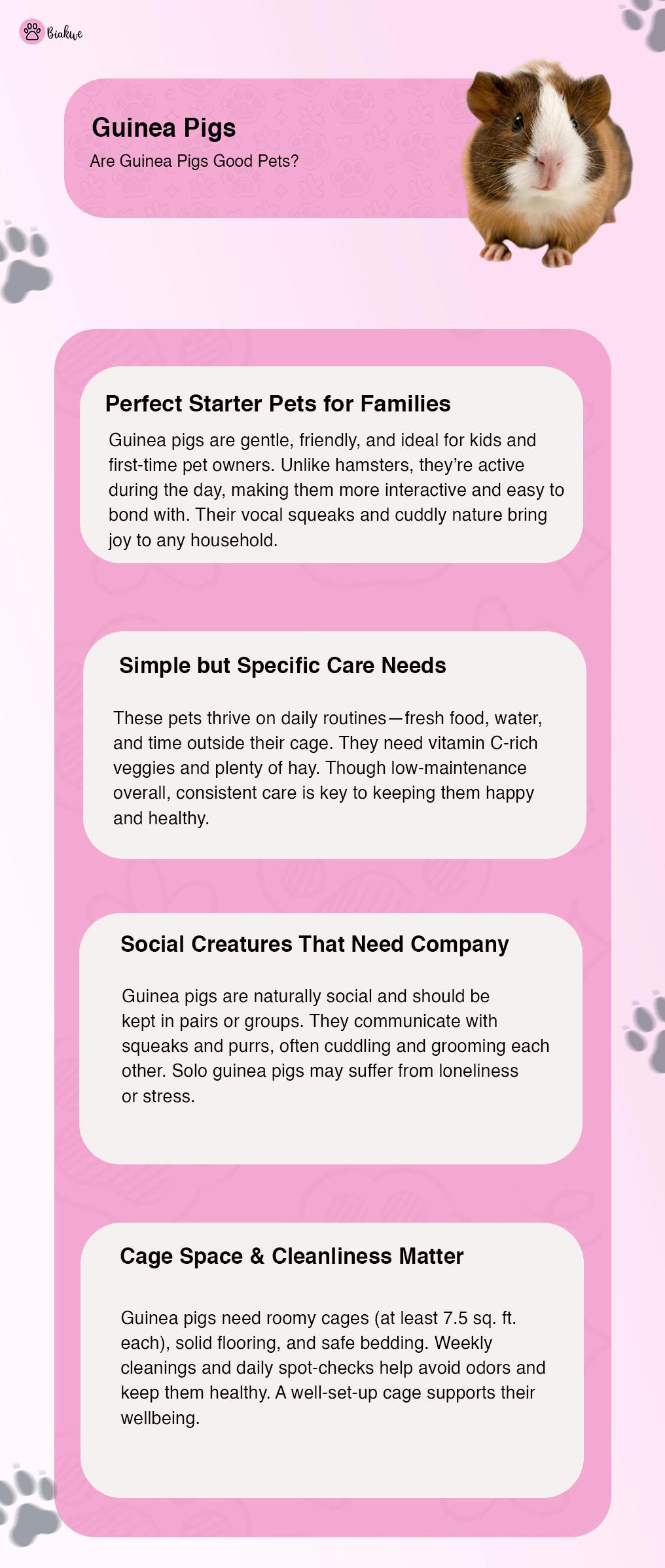Guinea pigs are one of the most popular small pets, especially for families with kids. But are they the right pet for you? This guide covers everything you need to know—from their lifespan and cage setup to their social needs and daily care.
Why Guinea Pigs Make Great Pets?
Guinea pigs represent ideal initial pets for multiple groups, including families and first-time pet owners, together with avid animal enthusiasts. Guinea pigs possess gentle and friendly behaviour, which creates wonderful friends, especially important for children learning about animal care responsibilities.
Guinea pigs remain gentle in their nature while showing positive reactions to proper human handling, although other tiny pets might exhibit biting and fearfulness.

These pet creatures remain active during daytime hours so families can watch their interactive behaviour, whereas the nocturnal habits of hamsters make it harder to observe their behaviour. Their alertness allows them to distinguish between different people, and they respond to spoken words and produce joyful squeaks when they receive food.
Their social behaviour makes them perform best in pairs, so they display interactive behaviours, including mutual grooming and constant cuddling, in addition to their energetic playfulness.
See this blog: Top Pet Names for Siamese Cats in 2025
Guinea pigs typically live from 5 up to 7 years when owners provide them proper care for extended companion opportunities. Pet guinea pigs are suitable for small living spaces because they require minimal space compared to cats or dogs and create a low odour when owners maintain regular cleaning routines. Guinea pigs create endless joy in the household thanks to their expressive vocalization and friendly characteristics.
The combination of friendliness, active nature and minimal pet care needs makes guinea pigs stand out as fantastic pet choices.
Essential Guinea Pig Food Guide
Proper nutritional intake provides the foundation for the good health of guinea pigs. Because their bodies lack the ability to synthesize vitamin C, rodents require daily consumption of fresh vegetables together with high-quality pellets.
Timothy hay should form 80% of their daily food due to its digestive benefits and its capability to promote dental health. Guinea pigs require fresh vegetables such as bell peppers with kale as well as carrots, which provide vitamin C. For daily feeding, give them specially made pellets in minimal portions, but avoid giving them pellets with added sugars. Guinea pigs need constant access to fresh drinking water, which should be stored in leak-proof bottles.
Moving away from feeding potatoes and iceberg lettuce and avoiding overconsumption of fruits will prevent digestive problems. A balanced diet protects pets from obesity as well as dental problems and Vitamin deficiency.

Ideal Guinea Pig Cage Setup
Caging your pet properly produces positive effects on their health and happiness. A single guinea pig needs cage space of at least 7.5 square feet, while larger areas provide better overall welfare benefits for the pet.
Solid flooring protects guinea pigs from foot injuries; thus, wire-bottom cages should be avoided. Hideouts that include small shelters or tunnels function as stress-reducing elements. Choose paper-based materials or fleece liners as bedding alternatives because cedar or pine shavings can cause harm. Wooden blocks serve as chew toys that prevent excessive growth of guinea pig teeth. Food dishes and a hay rack enable easy and hygienic access to their meals.
Spot cleaning the cage daily, combined with complete weekly cleaning, will maintain hygienic conditions while avoiding bad smells.
Pros & Cons of Owning Guinea Pigs
Before adopting, it’s important to weigh the advantages and challenges of keeping guinea pigs. Before bringing a guinea pig home, it’s important to consider both the benefits and challenges of caring for them.\

Pros of Guinea Pigs as Pets
- Great for Kids – Gentle, rarely bite, and enjoy interaction, making them ideal for families.
- Social & Friendly – Form strong bonds with owners and other guinea pigs, unlike solitary pets.
- Diurnal (Active During Day) – Unlike nocturnal hamsters, they’re awake when kids are, making them more engaging.
- Longer Lifespan – Live 5-7 years, providing longer companionship than hamsters or mice.
- Low Aggression – Rarely show aggression, making them safe for gentle handling.
- Expressive & Vocal – Communicate with cute squeaks, purrs, and whistles, adding personality.
Check this out: A Guide to Black Smoke Maine Coons: Traits, Care and More
Cons of Guinea Pigs as Pets
- Need Large Cages – Require at least 7.5 sq. ft. per pig, taking up significant space.
- Daily Fresh Veggies Required – More dietary maintenance than some small pets.
- Can Be Noisy – Squeak loudly when hungry or excited, which may be disruptive.
- Need Companionship – Should be kept in pairs, increasing care responsibilities.
- Weekly Cage Cleaning – Messier than some pets, requiring regular upkeep.
- Veterinary Costs – Exotic pet vets may be needed, which can be expensive.
Understanding Guinea Pig Social Behavior
Guinea pigs function best as social creatures when placed in groups of two or more. A single guinea pig faces loneliness and depression, which makes it essential to keep a minimum of two pets together. Breeding preparation is required for same-sex pair recommendations.
The communication between these pets includes wheeking for excitement and purring during contentment, while their rumbling sounds help them maintain dominance. When forming bonds, the animals consistently maintain physical contact through mutual grooming or hugging behaviour. Mild fights occasionally develop to create social order, but severe aggressive encounters are almost never observed.
The introduction of new guinea pigs should happen in a common neutral area while allowing for slow integration to decrease territorial conflicts. The right social preparation leads to an environment of peaceful group behaviour.
Time & Effort Required for Guinea Pig Care
While guinea pigs are easier to care for than dogs or cats, they still require daily attention and commitment.
Daily tasks include providing fresh food and water, spot-cleaning soiled bedding, and spending at least 30 minutes interacting with them. Handling them regularly helps build trust and keeps them tame.
Weekly responsibilities involve cleaning the cage, checking nails for trimming, and monitoring their health—observing their weight, teeth, and fur condition. Though they are relatively low-maintenance, neglecting their needs can lead to health and behavioural issues.
Read more: Summer Doggy: Tips to Keep Your Dog Cool, Safe & Happy
Final Verdict
For suitable pet owners, guinea pigs have proven to be ideal domestic animals. These animals display favourable characteristics for home environments when cared for by new owners but especially cater to family households.
Guinea pigs experience joyful lives when they receive a big cage and proper food while sharing their space with friends and regular human contact. The needs of guinea pigs consist of a proper cage with space and appropriate food combined with friendship and daily playtime, which leads to their expressive personalities and affectionate behavior.
Has the time come to bring a guinea pig into your residence? These easy pet for kids need appropriate care to provide domestic satisfaction throughout multiple years.
